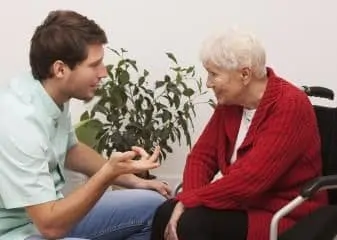Transitioning A Loved One With Dementia
Transitioning a loved one with dementia can be a difficult process for all involved. Some situations requiring transitions are unexpected such as a fall that leads to the ER or some are a scheduled transition such as a transfer to a rehab center or to a long term care facility because the existing care arrangement is no longer working.
Transitions are emotional, but to help reduce stress, I suggest the following tips:
- Due to the progressive debilitating nature of dementias, transitions can be expected so caregivers should plan ahead if possible. Have a “ready to go” bag set aside containing anticipated documents, emergency contact numbers, medical information and list of medications and allergies. In addition include items that bring comfort such as music and photos. Bring snacks, an extra sweater, and any other necessities.
- Keep in mind that the person with dementia is often not able to participate in the decision to transfer and may not understand the change in the care needed. Recognize this and respond reassuringly that you are going to make things better.
- Communicate the reason for transitioning to your loved one with dementia in a reassuring tone of voice and relay the reason in a positive, single sentence such as, “We are going together so you can get better.”
- When possible, ask a family member or friend to join or meet you at the destination. This will free you in case you need to speak with staff, deal with other matters or just take a needed break.
Caregivers will need to be very active both physically and mentally during transitions so remember to replenish by hydrating, eating nutritious food, and getting rest.
If you need advice tailored to your specific situation, contact me at: http://www.viviangreenkorner.c...
It’s Fall- Let’s Prevent Falls
According to the World Health Organization, as a person ages, the risk for falls increases due to several factors such as changes in physical function, sensory input, and cognition.
A person living with cognitive impairment is two to three times more likely to experience a fall with serious injury than their cognitively intact contemporaries (Mirolsky-Scala & Kraemer, 2009).
Risk factors for falls are mainly due to Lewy Body Dementia, dementia related to Parkinson’s disease, psychotropic medication, visual-spatial perception, functional disabilities, and behavioral disturbances.
Preventing Falls
Here are some tips to prevent falls:
- Environmental Adaptations
- Remove any tripping and slipping hazards such as scattered rugs and electric cords.
- Have in place good lightening and keep some form of light on especially at night for those who get up in the middle of the night.
- Place frequently used items within arms reach.
- Install grab bars for transferring.
- Use a mattress alarm or include a bed cane for balance.
- Physical Security
- Engage in ongoing balance and strength exercises.
- Instruct the individual to look down and pivot his/her feet in the direction he/she intends to move.
- Wear proper footwear.
- Communication Strategies
- Do not communicate from another room; go into the room where the person is located.
- When speaking, stand directly in front and at eye level of the individual.
- Cue (either verbally or non verbally) the individual as to how and where to move.
- Offer transfer assistance.
Need my assistance or a referral? Contact me at: viviangreenkorner.com
Men As Caretakers
At present, more and more men are taking care of their wives, mothers and even sisters. In addition to the day-to-day challenges that face caregivers, men often are in unfamiliar territory when it comes to offering personal and intimate care. Applying make-up, putting on pantyhose, and selecting a correct fitting bra to mention a few. To exacerbate the unique challenges, men don’t tend to ask for help and they often lack social support.
I know the issues first hand from my clients. Women cared for by men often look more disheveled, less coiffed, and some have body odor. Due to their dementia, they don’t realize these things. However, as outsiders, we see the change.
How can we help?
The first step to helping these dedicated caregivers is to understand their challenges and offer assistance.
Here’s some practical advice:
- Bring to a hairdresser a past photo of the hairstyle that the female with dementia wore. This will get her back in her familiar style. If it is challenging to get her to a hairdresser, there are hairdressers who make house calls!
- Show the male caregiver how to apply make up.
- Consider what are her favorite clothing colors and styles and help him select outfits. Don’t forget to accessorize if it is familiar and safe to wear.
- As an outing he can take her out for a manicure or pedicure if that was her habit. Perhaps even an outing to try on different shades of lipstick.
There are so many ways women have prided themselves by creating their own style, way of taking care and pampering themselves. Let’s give a helping hand to these dedicated male caregivers and remember, don’t wait to be asked cause men don’t tend to ask for help!
If I can be of assistance, don’t hesitate to contact me.






